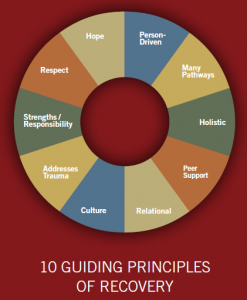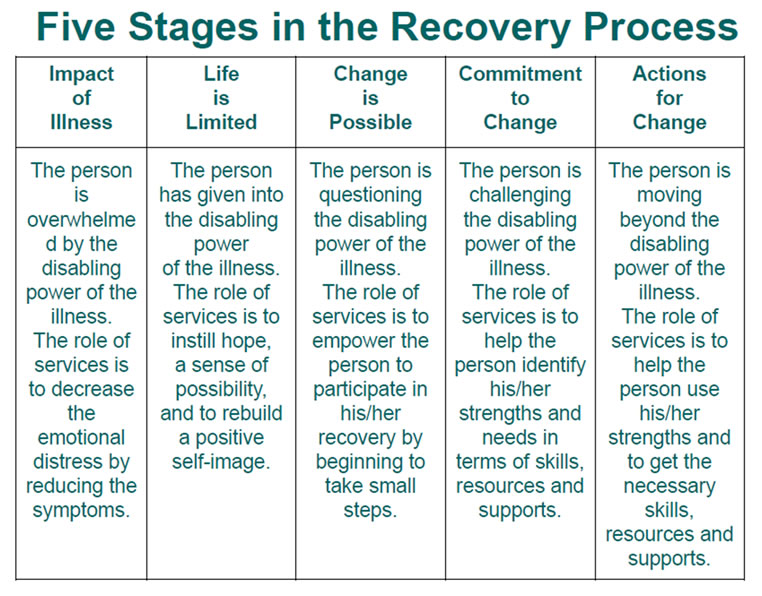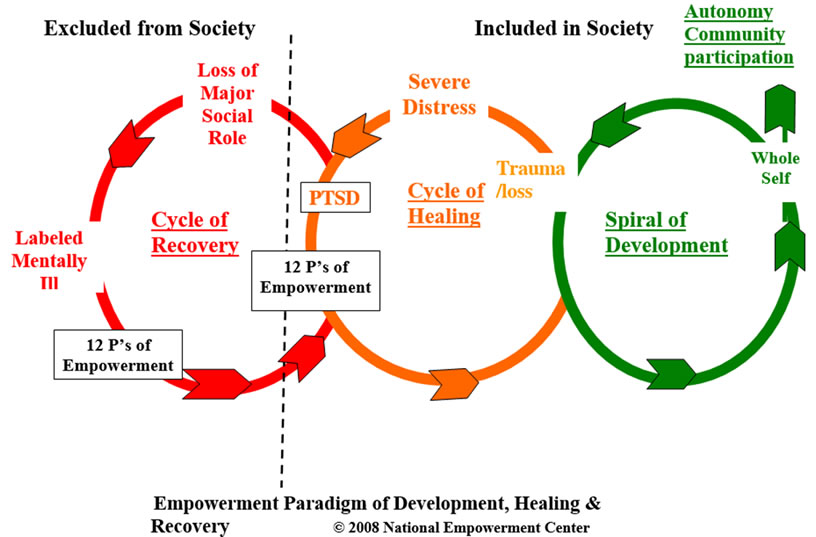It Begins with You
Recovery & Resilience > RecoveryRecovery
Behavioral health systems have adopted a definition of recovery in recent years that has set an expectation for positive outcomes for individuals who experience mental illness or substance use. Today, individuals with mental and/or substance use disorders who seek help are met with the knowledge and belief that anyone can recover or manage their conditions successfully. Recovery-oriented behavioral health systems are generally accepted and supported by states, communities, health care providers, peers, families, researchers, and advocates, including the U.S. Surgeon General and the Institute of Medicine.
Four Dimensions of Recovery
SAMHSA has delineated four dimensions that support a life in recovery:
- Health—overcoming or managing one’s disease(s) or symptoms—for example, abstaining from use of alcohol, illicit drugs, and non-prescribed medications if one has an addiction problem—and, for everyone in recovery, making informed, healthy choices that support physical and emotional well-being
- Home—having a stable and safe place to live
- Purpose—conducting meaningful daily activities, such as a job, school volunteerism, family caretaking, or creative endeavors, and the independence, income, and resources to participate in society
- Community—having relationships and social networks that provide support, friendship, love, and hope
Guiding Principles
An overview of SAMHSA’s 10 Guiding Principles of Recovery are shown in the figure. In summary they are that:
- Recovery emerges from hope – people can and do overcome the challenges that confront them.
- Recovery is person-driven – individuals define their own life goals and design their unique path toward those goals.
- Recovery occurs via many pathways – Recovery pathways are highly personalized because they are built on the multiple capacities, strengths, talents, coping abilities, resources and inherent value of each individual.
- Recovery is holistic – It encompasses an individual’s whole life, including mind, body, spirit, and community.
- Recovery is supported by peers and allies – Mutual support, including the sharing of experiential knowledge and skills, as well as social learning, play an invaluable role in recovery.
- Recovery is supported through relationship and social networks – An important part of the recovery process is the presence and involvement of people who believe in the person’s ability to recover.
- Recovery is culturally based and influenced – Services should be culturally grounded and personalized to support each person’s journey and unique pathway to recovery.
- Recovery is supported by addressing trauma – Services should be trauma-informed to foster safety (physical and emotional) and trust, as well as promote choice, empowerment, and collaboration.
- Recovery involves individual, family, and community strengths and responsibility – Individuals should be supported in speaking for themselves; families should support their loved ones; and communities should provide opportunities and resources to foster social inclusion and recovery.
- Recovery is based on respect – Community, systems, and societal acceptance and appreciation for people affected by mental health and substance use problems are crucial in achieving recovery.
Source: SAMHSA Recovery guide – https://store.samhsa.gov/shin/content//PEP12-RECDEF/PEP12-RECDEF.pdf
Peer Support
By sharing their experiences and offering support, peers bring hope to people in recovery and promote a sense of belonging within the community. Peers have common life experiences with the people they are serving. They have a unique capacity to help others due to their shared affiliation and deep understanding that comes from having similar experiences with mental and/or substance use disorders. They offer much needed support, strength, and hope to their peers, which allows for personal growth, wellness promotion, and recovery.
Research has shown that peer support facilitates recovery and reduces health care costs. Peers also provide assistance that promotes a sense of belonging within the community, which is key to recovery and well-being. Peers role model ongoing recovery by showing others how they find meaning, purpose, and social connections in their lives (SAMHSA Peer Support and Social Inclusion webpage).
Larry Fricks (2011) says the role of peer support in the recovery process is to promote hope and focus on strengths. The figure below describes the five stages in the recovery process along with the role of the peer services.
Source: Fricks, L. (2011, February 22). National Mental Health Peer Workforce Forum 2011: Reflections on starting a peer workforce. Presentation in Sydney, Australia.
Empowerment Paradigm
The Empowerment Paradigm of Development, Healing and Recovery (see diagram) from Dr. Dan Fisher at the National Empowerment Center was developed as an alternative to the traditional medical model of illness, which is primarily controlled by medication and the doctor rather than by the person. The empowerment model of recovery suggests that if a person with mental illness experiences empowerment and people who believe in them, they can heal and continue with their own personal development.
This paradigm provides a compelling vision of moving from a position of being excluded from society due to being labeled as mentally ill, through three cycles – the cycle of recovery, the cycle of healing, and the spiral of development, which represents the increasing growth of a person’s voice and self. The cycle is nourished by the 12 Principles of Empowerment. When this happens, the person is able to establish meaningful relationships, love, and work.
12 Principles of Empowerment
Consumer/survivors have organized themselves in order to change a system of care that had a history of being insensitive to the needs of those with mental illness, and abusive in the way it institutionalized people and treated them inhumanely. Critical to developing consumer-driven policies is to develop a large number of consumer advocates. The National Empowerment Center developed consumer training based on 12 principles of empowerment (by Daniel Fisher and Judi Chamberlin), which the center derived from interviewing experienced advocates. The goal of the training is to help consumers express their own voices. The 12 Principles of Empowerment, all starting with the letter P, are as follows:
- Personal connections: Perhaps the most important first step in becoming an empowered advocate is to get together with other advocates.
- Passion: It is essential to transform anger and resentment into passion.
- Principles of recovery: Outline a recovery-based system which is consumer-driven and self-determining on the individual and systems levels, centered on peer support and self-help which enables people to achieve full community participation, or social inclusion, through valued roles (e.g., worker, student, parent, tenant, etc.)
- Positive view of the future: Hope needs to reside deeply, insistently inside one’s being to inspire oneself and others to hope again.
- Purpose: Many of us have had to find a purpose to anchor and invest in our lives, rather than passively or actively seeking an exit. Empowerment is about finding purpose because having a sense of purpose empowers our life.
- Persistence, perseverance, and patience: Never give up, never quit… With enough persistence anything can come to be… what we believe can become reality.
- Presence: Capacity to quickly, positively impact people through pride, poise, and politeness.
- Persuasion: Capacity to get people to see your point of view through discussion.
- Practical prioritized advocacy plan which needs to come from a well-prepared participant: If you are going to change policies you need a concise, prioritized plan, which you can propose.
- Public presenting: Learning how to present yourself and your ideas to others is another vital aspect of individual and collective empowerment.
- Partnering though mediating, and negotiating.
- Politics: Politics is the process by which groups of people make decisions.


